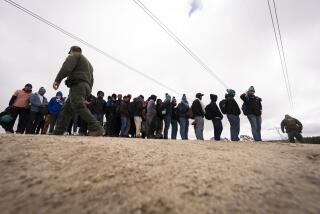A Cure for ‘Compassion Fatigue’
- Share via
When is a refugee not a refugee? When he (or she) is an “economic” refugee, and not someone on the run from political reprisals.
That is the answer accepted by the participants in the United Nations-sponsored Conference on Indochinese Refugees held last week in Geneva. The answer made it possible to adopt a comprehensive plan to deal with the enormous outflow of Vietnamese and Cambodians seeking asylum abroad. But the answer raises other questions.
Refugees are different from regular immigrants. Because they have suffered from war or political persecution, they are accorded a special status in international law. Countries that accept them pay to resettle them; other immigrants must pay their own way.
The 76 countries at the conference agreed to screen asylum-seekers in Hong Kong, Thailand and other transit points to separate those who face a “well-founded fear of persecution” from those who merely seek a better life elsewhere. Under the agreement, those deemed “not to be refugees”--that is, those who left for economic, not political reasons--will be urged to return home voluntarily. Vietnam has pledged to arrange for the “orderly departure” of emigrants, for the first time making it possible for people who wish to leave the country to do so legally by airliner instead of illegally on overcrowded fishing vessels.
The plan should do much to ease the strain on Hong Kong and other countries which have accepted many refugees and suffer from “compassion fatigue.” Now that a standard procedure has been accepted, boat people already in camps in these “countries of first asylum” can be processed more rapidly. A U.N. information program inside Vietnam should help stem the flow by spreading the word that not all who leave will be automatically granted refugee status.
The screening and voluntary repatriation may seem the best available solution to the problem, but the distinction between political and economic refugees is troubling. Are political refugees really distinguishable from economic refugees? What is it that a person out of step with a repressive system rails against: lack of political choice, lack of economic choice or both? The United States long ignored the distinction in relation to Soviet refugees but have been screening Vietnamese since 1982. Are the Vietnamese different?
Maybe. A large portion of those leaving are from the north of Vietnam, had no ties to the South Vietnamese government and are single, young men in their 20s who were children during the war. Their claim to political persecution is weak while the economic lure of the West is strong. Vietnam’s continued war against Cambodia is costing thousands of lives and stalling economic development. The only real solution to their migration is an improvement of the economic and political atmosphere within Vietnam.
In the meantime, it is important that the principle of asylum not be lost in all the talk of screening procedures and processes. People should have the right to flee persecution and be welcomed by the rest of the world. For re-articulating this fundamental principle, we commend the U.S. delegation. Asylum may be different from immigration, but fatigue is no excuse for a lapse in compassion.
More to Read
Sign up for Essential California
The most important California stories and recommendations in your inbox every morning.
You may occasionally receive promotional content from the Los Angeles Times.










